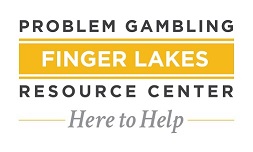

Editor’s Note: This was submitted by the Finger Lakes Problem Gambling Resource Center.
Problem Gambling & Pride Month
Happy Pride Month! June is established to recognize the impact that gay, lesbian, bisexual, transgender, and queer individuals have had on the world. LGBTQIA+ groups celebrate this special time with pride parades, picnics, parties, memorials for those lost to hate crimes and HIV/AIDS, and other group gatherings. It’s also important to recognize that the LGBTQIA+ community has been impacted by various mental health issues, including problem gambling. Problem gambling is anytime someone’s life is negatively impacted by their gambling habits. This could be financial struggles, relationship or partner issues, conflicts with work and school, and even translating to criminal behavior.
Unfortunately, there is limited research on the prevalence of gambling addiction among the LGBTQIA+ community. However, the information that is available does suggest that there is a correlation between problem gambling and those who identify as gay, bisexual, and transgender. A 2006 U.S. study reports that 21% of 105 men seeking treatment for problem gambling identified as gay or bisexual. That percentage is 7x higher than the (reported) rate of gay and bisexual men in the general population (21% as opposed to 3%) raising the possibility that gay/bi men might be at increased risk for problem gambling (Grant, JE, and Potenza, MN, 2006). Additionally, a 2015 Australian study reports that 20.2% of 69 LGBT participants met DSM V criteria for gambling disorder. Pub/slot games (58%) and scratch offs (43%) were most common about LGBTI populations. The amount spent ranged from $1 – $3K per month. Reasons were “because it is fun” and “because I like the feeling.”
The most important takeaway from these limited studies is that it’s important to have a comprehensive screening system in place for all individuals receiving treatment for problem gambling, especially screening specifically for LGBTQIA+ folks who are already in care or seeking treatment for mental health or chemical dependency needs. First and foremost, establishing a safe environment for clients should be a normalized step within all counseling and therapy-related practices. Secondly, help is available for problem gambling no matter how you identify. The Finger Lakes Problem Gambling Resource Center (PGRC) is excited to promote our clinicians who are experienced in treating LGBTQIA+ individuals, as well as have training in cultural humility. Below are some barrier-free options the Finger Lakes PGRC offers our community:
-In person or teletherapy counseling (individual or couples therapy)
-Connection to Gambler’s Anonymous or Gam-Anon
-Online family support group
-Guidance through the NYS Casino Self-Exclusion Program
-Online tools and resources, including self-assessment screening
-Connection to statewide inpatient and outpatient treatment services
To get started, call the Finger Lakes PGRC at (585) 351-2262 or email FingerLakesPGRC@nyproblemgambling.org.
For more information, visit https://nyproblemgamblinghelp.org/